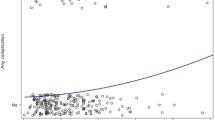Abstract
Introduction
The performance of most bariatric procedures within an Enhanced Recovery After Surgery program has resulted in significant advantages, including a reduction in the length of hospital stay to 2–3 days. However, some postoperative complications may appear after the patient has been discharged. The aim of this study was to investigate the efficacy of various acute-phase parameters determined 24 h after a laparoscopic sleeve gastrectomy for predicting staple line leak in the postoperative course.
Patients and methods
A prospective study of 208 morbidly obese patients undergoing laparoscopic sleeve gastrectomy as bariatric procedure between 2012 and 2015 was performed. Blood analysis was performed 24 h after surgery. Acute-phase parameters (C-reactive protein, procalcitonin, fibrinogen, and White Blood Cell count) were investigated.
Results
Staple line leak appeared in eight patients (3.8%). Using receiver operating characteristic analysis at 24 h postoperatively, a cutoff level of CRP at 9 mg/dL achieved 85% sensitivity and 90% specificity for predicting staple line leak, a cutoff level of procalcitonin at 0.85 ng/mL achieved 70% sensitivity and 90% specificity, and a cutoff level of fibrinogen at 600 mg/dL achieved 80% sensitivity and 87.5% specificity.
Conclusion
An elevation of CRP > 9 mg/dL, procalcitonin > 0.85 ng/mL and fibrinogen > 600 mg/dL should alert the surgeon the possibility of occurrence of postoperative staple line leak.

Similar content being viewed by others
References
Buchwald H, Williams SE (2004) Bariatric surgery worldwide 2003. Obes Surg 14:1157–1164
Maggard MA, Shugarman LR, Suttorp M, Maglione M, Sugerman HJ, Livingston EH et al (2005) Meta-analysis: surgical treatment of obesity. Ann Intern Med 142:547–559
Buchwald H, Avidor Y, Braunwald E, Jensen MD, Pories W, Fahrbach K et al (2004) Bariatric surgery: a systematic review and meta-analysis. JAMA 292:1724–1737
Cottam D, Qureshi FG, Mattar SG et al (2006) Laparoscopic sleeve gastrectomy as an initial weight-loss procedure for high-risk patients with morbid obesity. Surg Endosc 20:859–863
Melissas J, Daskalakis M, Koukouraki S et al (2008) Sleeve gastrectomy—a “food limiting” operation. Obes Surg 18:1251–1256
Wilmore DW, Kehlet H (2001) Management of patients in fast track surgery. BJM 322:473–476
Teeuwen PH, Bleichrodt RP, Strik C et al (2010) Enhanced Recovery After Surgery (ERAS) versus conventional postoperative care in colorectal surgery. J Gastrointest Surg 14:88–95
Spanjersberg WR, Reurings J, Keus F et al (2011) Fast track surgery versus conventional recovery strategies for colorectal surgery. Cochrane Database Syst Rev 2:CD007635
Schauer PR, Ikramuddin S (2001) Laparoscopic surgery for morbid obesity. Surg Clin N Am 81:1145–1179
Coskun H, Yardimci E (2016) Effects and results of fibrin sealant use in 1000 laparoscopic sleeve gastrectomy cases. Surg Endosc 31:2174–2179
Albanopoulos K, Alevizos L, Natoudi M et al (2013) C-reactive protein, white blood cells, and neutrophils as early predictors of postoperative complications in patients undergoing laparoscopic sleeve gastrectomy. Surg Endosc 27:864–871
Gustafsson UO, Scott MJ, Schwenk W et al (2013) Guidelines for perioperative care in elective colonic surgery/Enhanced Recovery After Surgery (ERAS) Society Recommendations. World J Surg 37:259–284
Jakob T, Cal P, Deluca L et al (2016) Shorter than 24 h hospital stay for sleeve gastrectomy is safe and feasible. Surg Endosc 30:5596–5600
Pompilio E, Casigliani R, Sommariva S, Saggese MP (1989) Acute phase proteins as markers of septic risk in surgical patients. Minerva Chir 44:2185–2190
Iossa A, Abdelgawad M, Watkins BM et al (2016) Leaks after laparoscopic sleeve gastrectomy: overview of pathogenesis and risk factors. Langenbecks Arch Surg 401:757–766
Welsch T, Muller SA, Ulrich A et al (2007) C-reactive protein as early predictor for infectious postoperative complications in rectal surgery. Int J Colorectal Dis 22:1499–1507
Matthiessen P, Henriksson M, Hallbook O et al (2008) Increase of serum C-reactive protein is an early indicator of subsequent symptomatic anastomotic leakage after anterior resection. Colorectal Dis 10:75–80
Guven H, Altintop L, Baydin A et al (2002) Diagnostic value of procalcitonin levels as an early indicator of sepsis. Am J Emerg Med 20:202–206
Giaccaglia V, Salvi PF, Cunsolo GV et al (2014) Procalcitonin, as an early biomarker of colorectal anastomotic leak, facilitates Enhanced Recovery After Surgery. J Crit Care 29:528–532
Garcia-Granero A, Frasson M, Flor-Lorente B et al (2013) Procalcitonin and C-reactive protein as early predictors of anastomotic leak in colorectal surgery: a prospective observational study. Dis Colon Rectum 56:475–483
Author information
Authors and Affiliations
Corresponding author
Ethics declarations
Disclosures
Jaime Ruiz-Tovar, MD, PhD; Jose Luis Muñoz, MD, PhD; Juan Gonzalez, MD; Alejandro García, MD; Carlos Ferrigni, MD; Montiel Jimenez, MD; and Manuel Durán, MD, PhD, have no conflicts of interest or financial ties to disclose.
Rights and permissions
About this article
Cite this article
Ruiz-Tovar, J., Muñoz, J.L., Gonzalez, J. et al. C-reactive protein, fibrinogen, and procalcitonin levels as early markers of staple line leak after laparoscopic sleeve gastrectomy in morbidly obese patients within an Enhanced Recovery After Surgery (ERAS) program. Surg Endosc 31, 5283–5288 (2017). https://doi.org/10.1007/s00464-017-5602-1
Received:
Accepted:
Published:
Issue Date:
DOI: https://doi.org/10.1007/s00464-017-5602-1




